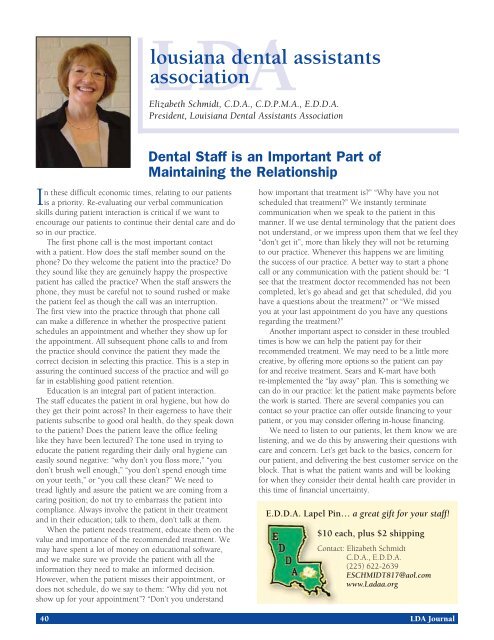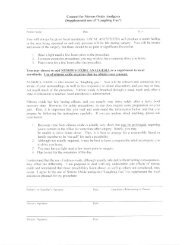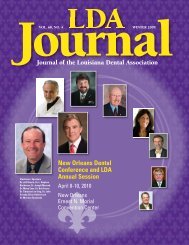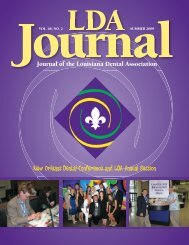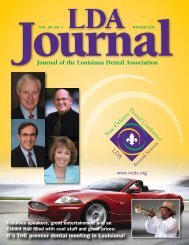Positive Ethics: Active Pursuit of the High Ground - Louisiana Dental ...
Positive Ethics: Active Pursuit of the High Ground - Louisiana Dental ...
Positive Ethics: Active Pursuit of the High Ground - Louisiana Dental ...
You also want an ePaper? Increase the reach of your titles
YUMPU automatically turns print PDFs into web optimized ePapers that Google loves.
LDA<br />
association<br />
Elizabeth Schmidt, C.D.A., C.D.P.M.A., E.D.D.A.<br />
President, <strong>Louisiana</strong> <strong>Dental</strong> Assistants Association<br />
lousiana dental assistants<br />
In <strong>the</strong>se difficult economic times, relating to our patients<br />
is a priority. Re-evaluating our verbal communication<br />
skills during patient interaction is critical if we want to<br />
encourage our patients to continue <strong>the</strong>ir dental care and do<br />
so in our practice.<br />
The first phone call is <strong>the</strong> most important contact<br />
with a patient. How does <strong>the</strong> staff member sound on <strong>the</strong><br />
phone? Do <strong>the</strong>y welcome <strong>the</strong> patient into <strong>the</strong> practice? Do<br />
<strong>the</strong>y sound like <strong>the</strong>y are genuinely happy <strong>the</strong> prospective<br />
patient has called <strong>the</strong> practice? When <strong>the</strong> staff answers <strong>the</strong><br />
phone, <strong>the</strong>y must be careful not to sound rushed or make<br />
<strong>the</strong> patient feel as though <strong>the</strong> call was an interruption.<br />
The first view into <strong>the</strong> practice through that phone call<br />
can make a difference in whe<strong>the</strong>r <strong>the</strong> prospective patient<br />
schedules an appointment and whe<strong>the</strong>r <strong>the</strong>y show up for<br />
<strong>the</strong> appointment. All subsequent phone calls to and from<br />
<strong>the</strong> practice should convince <strong>the</strong> patient <strong>the</strong>y made <strong>the</strong><br />
correct decision in selecting this practice. This is a step in<br />
assuring <strong>the</strong> continued success <strong>of</strong> <strong>the</strong> practice and will go<br />
far in establishing good patient retention.<br />
Education is an integral part <strong>of</strong> patient interaction.<br />
The staff educates <strong>the</strong> patient in oral hygiene, but how do<br />
<strong>the</strong>y get <strong>the</strong>ir point across? In <strong>the</strong>ir eagerness to have <strong>the</strong>ir<br />
patients subscribe to good oral health, do <strong>the</strong>y speak down<br />
to <strong>the</strong> patient? Does <strong>the</strong> patient leave <strong>the</strong> <strong>of</strong>fice feeling<br />
like <strong>the</strong>y have been lectured? The tone used in trying to<br />
educate <strong>the</strong> patient regarding <strong>the</strong>ir daily oral hygiene can<br />
easily sound negative: “why don’t you floss more,” “you<br />
don’t brush well enough,” “you don’t spend enough time<br />
on your teeth,” or “you call <strong>the</strong>se clean?” We need to<br />
tread lightly and assure <strong>the</strong> patient we are coming from a<br />
caring position; do not try to embarrass <strong>the</strong> patient into<br />
compliance. Always involve <strong>the</strong> patient in <strong>the</strong>ir treatment<br />
and in <strong>the</strong>ir education; talk to <strong>the</strong>m, don’t talk at <strong>the</strong>m.<br />
When <strong>the</strong> patient needs treatment, educate <strong>the</strong>m on <strong>the</strong><br />
value and importance <strong>of</strong> <strong>the</strong> recommended treatment. We<br />
may have spent a lot <strong>of</strong> money on educational s<strong>of</strong>tware,<br />
and we make sure we provide <strong>the</strong> patient with all <strong>the</strong><br />
information <strong>the</strong>y need to make an informed decision.<br />
However, when <strong>the</strong> patient misses <strong>the</strong>ir appointment, or<br />
does not schedule, do we say to <strong>the</strong>m: “Why did you not<br />
show up for your appointment”? “Don’t you understand<br />
<strong>Dental</strong> Staff is an Important Part <strong>of</strong><br />
Maintaining <strong>the</strong> Relationship<br />
how important that treatment is?” “Why have you not<br />
scheduled that treatment?” We instantly terminate<br />
communication when we speak to <strong>the</strong> patient in this<br />
manner. If we use dental terminology that <strong>the</strong> patient does<br />
not understand, or we impress upon <strong>the</strong>m that we feel <strong>the</strong>y<br />
“don’t get it”, more than likely <strong>the</strong>y will not be returning<br />
to our practice. Whenever this happens we are limiting<br />
<strong>the</strong> success <strong>of</strong> our practice. A better way to start a phone<br />
call or any communication with <strong>the</strong> patient should be: “I<br />
see that <strong>the</strong> treatment doctor recommended has not been<br />
completed, let’s go ahead and get that scheduled, did you<br />
have a questions about <strong>the</strong> treatment?” or “We missed<br />
you at your last appointment do you have any questions<br />
regarding <strong>the</strong> treatment?”<br />
Ano<strong>the</strong>r important aspect to consider in <strong>the</strong>se troubled<br />
times is how we can help <strong>the</strong> patient pay for <strong>the</strong>ir<br />
recommended treatment. We may need to be a little more<br />
creative, by <strong>of</strong>fering more options so <strong>the</strong> patient can pay<br />
for and receive treatment. Sears and K-mart have both<br />
re-implemented <strong>the</strong> “lay away” plan. This is something we<br />
can do in our practice: let <strong>the</strong> patient make payments before<br />
<strong>the</strong> work is started. There are several companies you can<br />
contact so your practice can <strong>of</strong>fer outside financing to your<br />
patient, or you may consider <strong>of</strong>fering in-house financing.<br />
We need to listen to our patients, let <strong>the</strong>m know we are<br />
listening, and we do this by answering <strong>the</strong>ir questions with<br />
care and concern. Let’s get back to <strong>the</strong> basics, concern for<br />
our patient, and delivering <strong>the</strong> best customer service on <strong>the</strong><br />
block. That is what <strong>the</strong> patient wants and will be looking<br />
for when <strong>the</strong>y consider <strong>the</strong>ir dental health care provider in<br />
this time <strong>of</strong> financial uncertainty.<br />
E.D.D.A. Lapel Pin… a great gift for your staff!<br />
$10 each, plus $2 shipping<br />
Contact: Elizabeth Schmidt<br />
C.D.A., E.D.D.A.<br />
(225) 622-2639<br />
ESCHMIDT817@aol.com<br />
www.Ladaa.org<br />
40 LDA Journal


